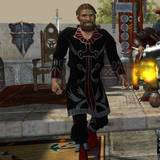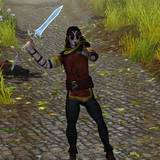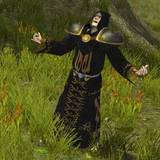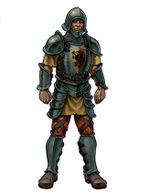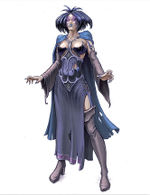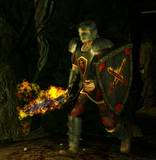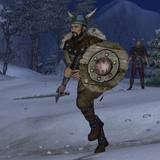History
Humans are former slaves of the Elves. They were entrusted to the Elves so that they might become civilized, just as the Seraphim used to civilize the Elves. Currently, they do not have any power in the Elven region of Tyr Lysia. They are obedient laborers, assisting the Elves in building their palaces, erecting sacred buildings for the High Priests and cultivating the fields.
Slaves to Elves
The Elves have built a wall to keep the Humans in their own separate territory, known as Artamark. Nevertheless, some Humans come across the border, mostly imported as servants or laborers to do the work that the Elves consider to be beneath themselves. Humans can become free, but they will never be regarded as “equal.” Elves regularly use Humans as servants, and are highly prejudiced against them – they don’t view Humans as property, exactly, but neither do they believe that Humans are capable of advanced thought or civilization. The attitude of both the common Elves and the nobility towards the Humans is similar to the traditional attitude towards the “untouchable” caste in India.
Free Humans
Although most Humans in Tyr Lysia are slaves, there also are some enclaves of freed Humans. In both cases, they live on the outskirts of the city in slums and run-down areas. For the slaves that's the best their masters will provide, for the others that's all their Elven landlords will rent to them. Where free Humans have gathered in small settlements consisting of a few huts, they continue to be the victims of prejudice and occasional attacks, and they know they will never receive justice under the law.
Frequently, an Elven Lord requires more troops than T-Energy can provide. In these cases, he has no choice but to literally pluck Humans from the fields. Each Elven Lord has a small group of Human elite fighters in order to drill and shape these troops and lead them into battle: the Shadow Warriors. Dark magic makes these elite Human fighters rise from the battlefield even if they are slain in combat. When a Shadow Warrior falls in battle, he may be reanimated by an ancient magical spell, which will render him undead, but even more powerful than before. The ritual of giving ‘life’ back to a Shadow Warrior is potentially dangerous for the caster, as the summoned soul often has no desire to be revived and will attempt to resist the reanimation. If the spell-caster makes just one small mistake, the Shadow Warrior will renounce the magic user, kill him, and then wander the lands of Ancaria, undead, with his own free will.
|
|
The player can take on the role of a Shadow Warrior in Sacred 2. He is the only playable Human character class in the game. The Shadow Warrior has fulfilled his duty. He has fallen during battle for a High Elf Lord and has been admitted to the Elysium. Knowing full well that he was one of the best of his trade, the High Elf Lord decides to bring the Shadow Warrior back from the realm of the dead by using T-Energy in order to secure his services beyond the boundaries of death itself. However, the conjuring ceremony goes spectacularly wrong as the summoned soul successfully defies the spell caster, freeing himself from the potential ties that might bind him.
|
The Human Homeland
The Human region of Artamark is primarily a feudal society, positioned just north of the High Elf region of Tyr Lysia. It is bordered by mountains, and the climate is one that supports several forest areas. The land of the Humans is green. Large woods cover Artamark. Beneath the trees the ground is fertile. The large variety of crops that grow here are responsible for the many tasty kinds of breads taverns serve in Artamark.
Behavior and Attitudes
Artamark is almost exclusively populated by Humans, with the bulk of them being in service to one lord or another. The political situation keeps things very agitated though, so one wonders how any of them manage to survive. The DeMordrey and Urtamark baronies are constantly at loggerheads with each other, and the fighting being reported in the northeast section of the region indicates a concentration of trouble. As if that wasn't enough, there are also rumors of activity from an obscure and disruptive cult in the southeast near Grunwald.
|
|
Human Soldiers in Artamark wear a variety of emblems, showing loyalty to their individual lord and land.
|
The Humans of Artamark are friendly and open-minded toward strangers. Strangers are welcome in Artamark, but its inhabitants generally do not care for High Elves or Orcs. This is understandable as High Elves regard Humans as slaves whereas Orcs constantly threaten Artamark’s northern borders.
Culture
- See also: Sacred 2:Art of Ancaria
Humans aren’t particularly renowned for their architectural masterpieces. There buildings are mainly simple and practical, and they seem to have no eye for beauty. The thatched huts and houses they live in look picturesque, but offer good protection against common winter storms. Most people in Artamark work as farmers or craftsmen, but some go to the woods and try their luck as hunters. They kill game for meat and sell the pelts to passing merchants. Brigands who also live in the woods often robe these merchants.
|
|
Some say that Witches practice their craft in the haunted forests of the Whisperwood.
|
The Dark Army
- See also: Sacred 2:Human (Opponents)
The Human territories are home to a large number of assassins and brigands. Human opponents who don't abide by the rules of society often become outcasts and band together in small groups to get what they want: gold and items from hapless heroes who wander by. More devious than most, these bad-tempered renegades will aggressively assault anyone they see, and sometimes even assail each other. However, special mention must be given to the Dark Army:
The Dark Army is a ruthless and savage entity bent on terrorizing the surrounding area and razing villages all in the name of the Unholy Crusade. This group is no ragtag band of outcast bandits - they are an organized and elite fighting force with Mages, Archers, and Knights in their ranks. Lately they have become bold enough to attack and lay siege to Kufferath Castle.
Humans in Other Regions
Humans can occasionally be found in other regions of Ancaria. However, due to their low standing and lack of power, groups of Humans outside of Artamark are often slaves, and small in number. Human slaves are regularly used as food for the great Dragons of the Dragon Sea Islands. It is rumored that humans who escape the Dragons' clutches can join up with the mysterious Blackhammer, who has formed a rebel outpost in the vast caverns there. Human gladiators can also be found fighting, perhaps unwillingly, in the arena at Badawi.
|
|
The Thraconians hail from the frozen Northland, a wintery island in the far Northeast of Ancaria. These fierce warriors have fur-lined armor, bushy beards, and helmets with wings and horns in the style of the classic "Viking" look. Recently they have been launching waves of invasions against Artamark. These Thraconian invaders can be found making incursions all along the Northern coast of Artamark. Artamark's soldiers have launched an expedition into the Northland, hoping to stem the tide of Thraconian barbarians at its source.
|
The Bengaresh Desert is home to a race of nomad tribes. These dark-skinned inhabitants are described in Geography of Ancaria, Book 5 - Bengaresh as descendants of Elves. However, in the game they seem to be treated as a race of humans, although distinct from both the High Elves and the Humans of the North. They are a free race that keeps to their own affairs and observes their own set of unique traditions.
Flag of Artamark
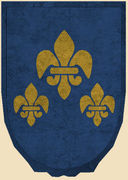
|
Flag of Urtamark
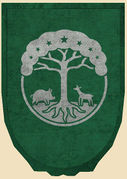
|
Flag of DeMordrey
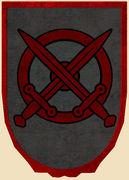
|
Dark Army Flag
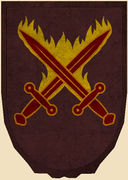
|
Pirate Bay Flag
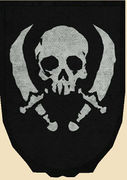
|





